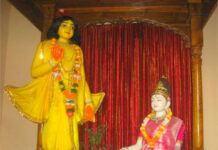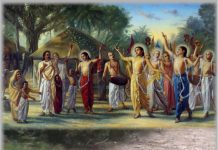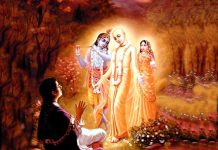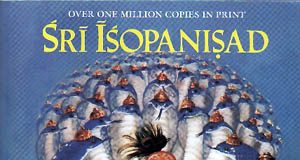Continued from previous page… Purports to Mantra 9 ends here with Srila Prabhupada explaining why those who are simply veda-vada-rata cannot understand the Absolute Truth. Mantra 10 discusses knowledge and nescience.

Such people misguide others by misinterpreting the Vedic literature. Sometimes they even condemn the Puranas, which are authentic Vedic explanations for laymen. The veda-vada-ratas give their own explanations of the Vedas, neglecting the authority of great teachers (acharyas). They also tend to raise some unscrupulous person from among themselves and present him as the leading exponent of Vedic knowledge. Such veda-vada-ratas are especially condemned in this mantra by the very appropriate Sanskrit words vidyayam ratah. Vidyayam refers to the study of the Vedas because the Vedas are the origin of all knowledge (vidya), and ratah means “those engaged.” Vidyayam ratah thus means “those engaged in the study of the Vedas.”
The so-called students of the Vedas are condemned herein because they are ignorant of the actual purpose of the Vedas on account of their disobeying the acharyas. Such veda-vada-ratas search out meanings in every word of the Vedas to suit their own purposes. They do not know that the Vedic literature is a collection of extraordinary books that can be understood only through the chain of disciplic succession.
One must approach a bona fide spiritual master in order to understand the transcendental message of the Vedas. That is the direction of the Mundaka Upanishad (1.2.12). These veda-vada-rata people, however, have their own acharyas, who are not in the chain of transcendental succession. Thus they progress into the darkest region of ignorance by misinterpreting the Vedic literature. They fall even further into ignorance than those who have no knowledge of the Vedas at all.
The mayayapahrita-jnana class of men are self-made “Gods.” Such men think that they themselves are God and that there is no need of worshiping any other God. They will agree to worship an ordinary man if he happens to be rich, but they will never worship the Personality of Godhead. Such men, unable to recognize their own foolishness, never consider how it is that God can be entrapped by maya, His own illusory energy. If God were ever entrapped by maya, maya would be more powerful than God.
Such men say that God is all-powerful, but they do not consider that if He is all-powerful there is no possibility of His being overpowered by maya. These self-made “Gods” cannot answer all these questions very clearly; they are simply satisfied to have become “God” themselves.
MANTRA 10
TRANSLATION. The wise have explained that one result is derived from the culture of knowledge and that a different result is obtained from the culture of nescience.
PURPORT. As advised in Chapter Thirteen of the Bhagavad-gita (13.8-12), one should culture knowledge in the following way:
(1) One should become a perfect gentleman and learn to give proper respect to others.
(2) One should not pose himself as a religionist simply for name and fame.
(3) One should not become a source of anxiety to others by the actions of his body, by the thoughts of his mind, or by his words.
(4) One should learn forbearance even in the face of provocation from others.
(5) One should learn to avoid duplicity in his dealings with others.
(To be continued to the next page…)
Source: Sri Isopanishad. Translation and purports by His Divine Grace A.C.Bhaktivedanta Swami Prabhupada. Copyright BBT International http://www.vedabase.com/en/iso

























